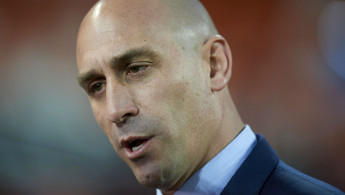Rights concerns raised as Saudi Arabia considered for Spanish Super Cup
The Spanish football federation is looking into playing its Super Cup in Saudi Arabia, prompting human rights concerns about the showpiece being staged in the kingdom.
Federation president Luis Rubiales said on Wednesday playing in Saudi Arabia is one of the options being considered for the competition from next year, as well as a ''final four'' format with the top finishers in the Spanish league and the Copa del Rey.
The competition has been played in a one-game final between the champions at the beginning of the season. The idea is to play the new Super Cup in January and it will be presented during the federation's general assembly next week.
When the Italian Super Cup was played in Saudi Arabia in January, Italian politicians and human rights activists protested, citing the assassination of Washington Post columnist Jamal Khashoggi at the Saudi Consulate in Istanbul.
The Spanish federation revealed its plans to play in Saudi Arabia a day after the mass execution of 37 men in the country, including three who were sentenced as minors.
UN human rights chief Michelle Bachelet condemned the beheadings as ''abhorrent'' and urged Saudi Arabia to review its counterterror legislation, expressly prohibit the death penalty for minors and halt pending executions.
Mary Harvey, chief executive of Center for Sport and Human Rights, said Saudia Arabia's record should be a ''significant factor'' for the Spanish federation when deciding whether to play in the country.
''Is it being considered? There are significant concerns about Saudi Arabia from a human rights perspective,'' Harvey said.
Rubiales did not take questions from reporters after the event in Madrid where the Super Cup plans were floated.
He did not confirm reports the deal will be worth 30 million euros ($33 million) a year for six seasons, saying ''it will be difficult'' to reach that value.
The federation president, one of the main critics of the Spanish league's idea to play a regular-season match in the United States, said the decision would take into consideration the players' health, noting that playing in Saudi Arabia would not affect them as much as if the game was played in the United States or Asia, where travel time and time differences were greater.
Last year's final, won by Barcelona against Sevilla, was played in Tangier, Morocco.
The Spanish players' association, which also complained about the Spanish league's attempt to play in the US, did not oppose the idea of playing in Saudi Arabia.
''We weren't against playing in the United States, what we wanted at the time was to be consulted about the idea and to give our opinion," association president David Aganzo said Wednesday at an event organised by Europa Press. ''If the proposal for the Super Cup is good for the players, we won't have a problem with it.''
The Spanish league had to scrap the game in Florida after Barcelona, which would have faced Girona, backed down because of the lack of consensus among the parties involved. The league said it will try playing abroad again next season.
There is also a plan by the federation to reduce the number of games in the Copa del Rey to help clear up the calendar and keep teams from playing too many matches. The competition would include single elimination matches in some rounds, instead of a two-leg series. The proposal is also expected to be presented in next week's general assembly.
''The clubs and the players want less official matches in the calendar,'' Rubiales said.
During its own general assembly later on Wednesday, the Spanish league voted not to support the changes proposed by the federation for the Super Cup and the Copa del Rey, saying the changes in the calendar must also be discussed with the league.
The league has also been in a dispute with Saudi Arabia over the pirating of broadcasts of its games.
Along with other top European leagues and football governing bodies, La Liga in January denounced Saudi Arabia-backed pirate network beoutQ for the ''persistent and illegal screening'' of games where Qatar's beIN Sports owns the Middle East rights.
The theft of sports rights is a proxy fight in the 19-month political and logistical boycott of Qatar by regional rivals including Saudi Arabia and the United Arab Emirates.





 Follow the Middle East's top stories in English at The New Arab on Google News
Follow the Middle East's top stories in English at The New Arab on Google News
![Both Hamas and the Palestinian Authority welcomed the ICC arrest warrants [Getty]](/sites/default/files/styles/image_330x185/public/2024-11/GettyImages-2178351173.jpg?h=199d8c1f&itok=TV858iVg)

